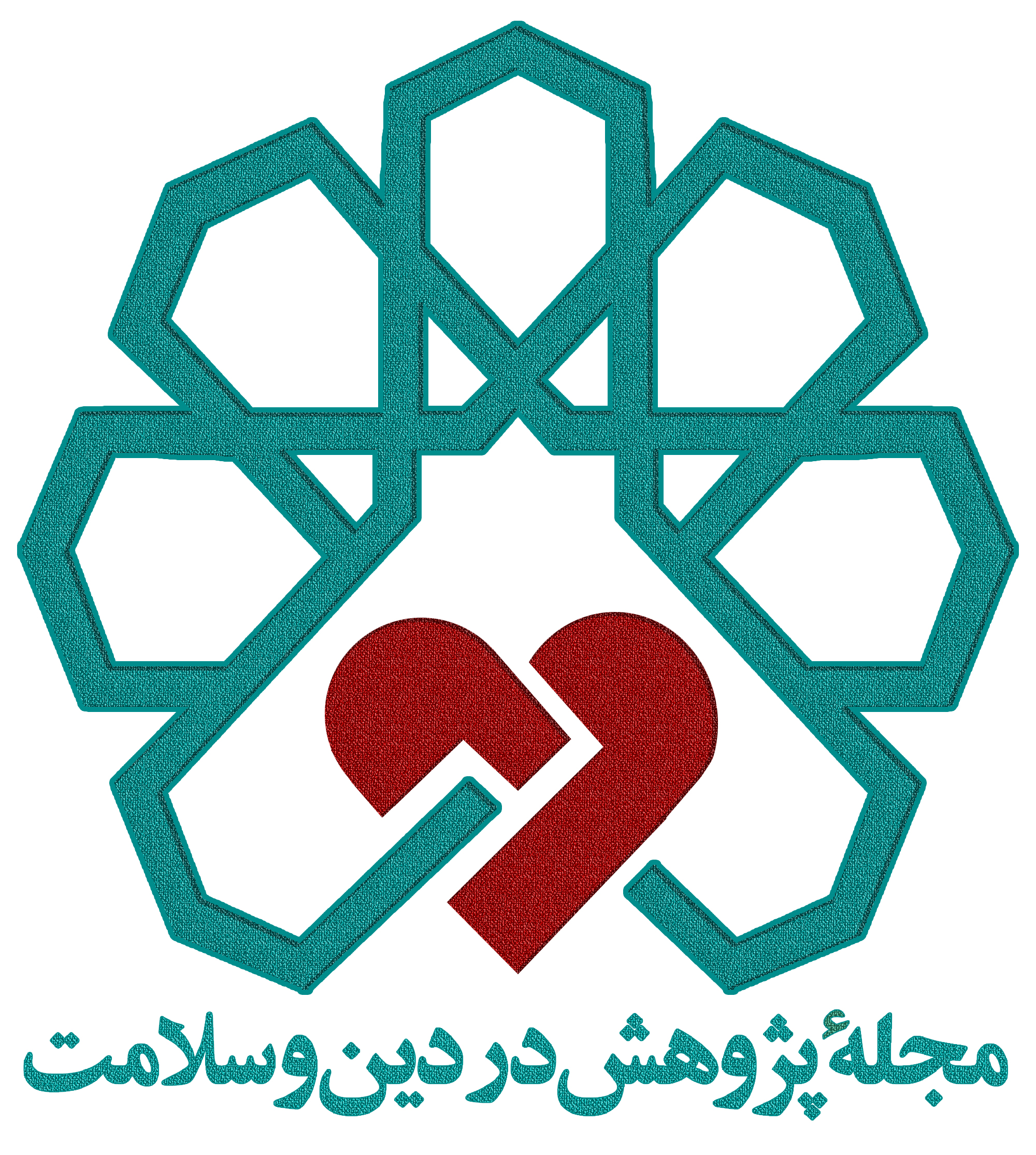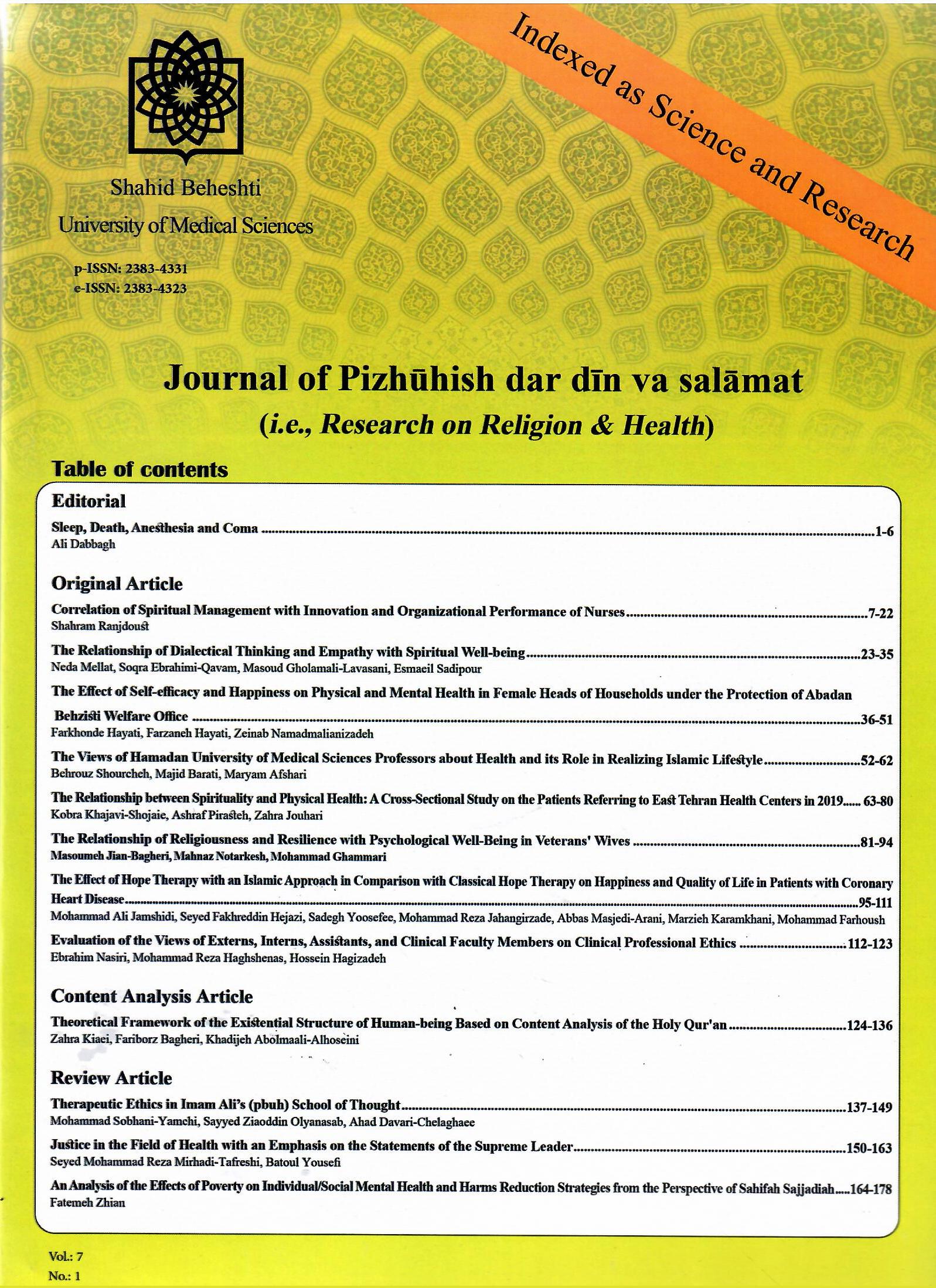رابطۀ تفکر دیالکتیک و همدلی با بهزیستی معنوی
پژوهش در دین و سلامت ,
دوره 7 شماره 1 (2021),
14 اسفند 2021
,
صفحه 23-35
https://doi.org/10.22037/jrrh.v7i1.29536
چکیده
سابقه و هدف: در سالهای اخیر علاقه به مطالعۀ بهزیستی معنوی و شناسایی عوامل شناختی و عاطفی اثرگذار بر آن رشد و اهمیت زیادی پیدا کرده است. نظریات فراانتزاعی، تفکر دیالکتیک را شرط دستیابی به همدلی و بهزیستی معنوی میداند. بنابراین، هدف اصلی از اين پژوهش بررسي رابطۀ تفکر دیالکتیک و همدلی با بهزیستی معنوی بزرگسالان بود.
روش کار: روش پژوهش حاضر مقطعی از نوع توصیفی-همبستگی است. جامعۀ آماری پژوهش تمامی افرادی بودند که در فاصلۀ سنی جوانی تا سالمندی (20 تا 60) در شهر اصفهان در سال 1396 ساکن بودند؛ از میان این افراد 450 نفر بهروش نمونهگيري دردسترس انتخاب شدند و با توجه به هدف مقایسۀ تحولی در چهار گروه 20 تا 29، 30 تا 39، 40 تا 49 و 50 تا 60 سال قرار گرفتند. ابزارهای استفادهشده در اين پژوهش عبارت بود از پرسشنامههای بهزیستی معنوی، باورهای پارادایم اجتماعی و واکنش بینفردی. بهمنظور تجزيه و تحليل دادهها از تحلیل رگرسیون و واریانس استفاده شد. در این پژوهش همۀ موارد اخلاقی رعایت شده است و مؤلفان مقاله تضاد منافعی گزارش نکردهاند.
یافتهها: نتايج بهدستآمده نشان میدهد كه تفکر دیالکتیک و همدلی رابطۀ خوب با خدا، خود و دیگران را پیشبینی کرد و تفکر دیالکتیک نقش مهمتری نسبت به همدلی در پیشبینی بهزیستی معنوی بزرگسالان داشت. نتایج تحلیل واریانس نیز نشان میدهد که سطوح سنی و دینداری از نظر بهزیستی معنوی تفاوت معناداری داشت.
نتیجهگیری: بر اساس یافتهها میتوان گفت تفکر دیالکتیک و راهبردهای همدلی در کنار دینداری نقش مهمی در بهبود روابط با خدا، دیگران و بهزیستی معنوی دارند و با پیشرفت سطح دینداری، بهزیستی معنوی نیز افزایش مییابد. علاوهبراین، بزرگسالی دوران تکمیل رشد معنوی است.
استناد مقاله به این صورت است:
Mellat N, Ebrahimi-Qavam S, Gholamali-Lavasani M, Sadipour E. The Relationship of Dialectical Thinking and Empathy with Spiritual Well-being. Journal of Pizhūhish dar dīn va salāmat. 2021;7(1):23-35. https://doi.org/10.22037/jrrh.v7i1.29536
- بهزیستی معنوی؛ تفکر دیالکتیک؛ دینداری؛ همدلی
ارجاع به مقاله
مراجع
Arterberry M, Fingerman K, Lansford J. Spiritual Development. 2017.
Fisher J. Development and application of a spiritual well-being questionnaire called SHALOM. Religions. 2010;1(1):105-21.
Sinnott JD. The Dance of the Transforming Self: Both Feelings of Connection and Complex Thought Are Needed for Learning. New Directions for Adult and Continuing Education. 2005;108:27-37.
Labouvie-Vief G. Emotions and cognition: From myth and philosophy to modern psychology and neuroscience. Integrating Emotions and Cognition Throughout the Lifespan: Springer; 2015. p. 1-16.
Riegel KF. Dialectic operations: the final period of cognitive development. Human Development, 1973; 16, 346-370.
Gibbs JC. Moral development and reality: Beyond the theories of Kohlberg, Hoffman, and Haidt: Oxford University Press; 2019.
Davis MH. Measuring individual differences in empathy: Evidence for a multidimensional approach. Journal of personality and social psychology. 1983;44(1):113.
Gervais WM. Perceiving minds and gods: How mind perception enables, constrains, and is triggered by belief in gods. Perspectives on Psychological Science. 2013;8(4):380-94.
Saroglou V. Religion, spirituality, and altruism. 2013;1:439-57.
Day JM. Believing as if: Postconventional stages, cognitive complexity, and postformal religious constructions. 2011.
Feizabadi Z, Farzad V, Shahraray M. Investigating the relationships between empathy, identity styles and commitment in humanities and technical-engineering students. Journal of Psychological Studies. 2007;3(2):65-90.
Gomez R, Fisher JW. Domains of spiritual well-being and development and validation of the Spiritual Well-Being Questionnaire. Personality and individual differences. 2003;35(8):1975-91. (Full Text in Persian)
Abhari MB, Fisher JW, Kheiltash A, Nojomi M. Validation of the Persian version of spiritual well-being questionnaires. Iranian journal of medical sciences. 2018;43(3):276-85. (Full Text in Persian)
Kramer DA, Kahlbaugh PE, Goldston RB. A measure of paradigm beliefs about the social world. Journal of Gerontology. 1992;47(3):P180-P9.
Asadi S, Amiri S, Molavi H. Development of post-formal thinking from adolescence through adulthood. Developmental Psychology 2014;10(38):161-74. (Full Text in Persian)
Molavi H. A practical guide to spss in behavioral science: Descriptive and inferential data analysis in research projects. Isfahan: Process of Thought press; 2014. (Full Text in Persian)
Huber JT, MacDonald DA. An investigation of the relations between altruism, empathy, and spirituality. Journal of Humanistic Psychology. 2012;52(2):206-21.
Nachiappan S, Andi HK, Veeran VP, Ahmad AI, Zulkafaly FHM. Analysis of cognition integration in intelligence quotient (iq), emotional quotient (eq) and spiritual quotient (sq) in transforming cameron highlands youths through hermeneutics pedagogy. Procedia-Social and Behavioral Sciences. 2014;112:888-97.
Safara M, Balali-Dehkordi N, Sadidpour SS. A Meta-analysis of the Effect of Religiosity and Spirituality on Treatment of Psychotic-clinical Disorders. Journal of Pizhūhish dar dīn va salāmat. 2019;5(3):124-36. (Full Text in Persian)
Damirchi ES, Mohammadi N, Fayazi M, Afsar E. Examining the relationship of psychological well-being with religious orientation and forgiveness among students at the University of Mohaghegh Ardabili. J Res Relig Health. 2017;3(2):20-30. (Full Text in Persian)
Dehghani F. The Relationship of Religious Orientation and Spiritual Health to Resilience among High School Sophomores in Kerman. J Res Relig Health. 2017;3(4):66-77. (Full Text in Persian)
Achenbaum WA. Lars Tornstam, Gerotranscendence: A Developmental Theory of Positive Aging, Springer Publishing Company, New York, 2005, 213 pp., hbk $39.95, ISBN 0 8261 3134 4. Ageing & Society. 2006;26(4):670-1.
- چکیده مشاهده شده: 361 بار

